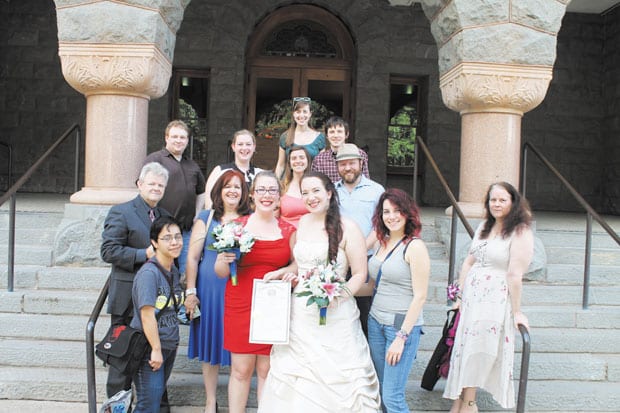
Wedding bells were ringing loud and clear in 2015 as the U.S. Supreme Court on June 26 issued its ruling affirming marriage equality as the law of the land. But the momentum actually began in the fall of 2014, when SCOTUS refused to hear appeals from several circuit courts, leaving pro-equality rulings in place. And the marriage equality movement continued to pick up steam as 2015 began.
The year began at the Fifth Circuit Court of Appeals with a Jan. 9 hearing on cases from Mississippi, Louisiana and Texas, and things didn’t go well for the anti-equality side. When conservative Judge Jerry Smith mentioned a decision from another Supreme Court case, Roberta Kaplan, the attorney arguing for equality in the Mississippi case, interrupted and said she was the winning attorney in that case. That seemed to shut him down.
Judge William Higginbotham, considered a swing vote on the panel, asked questions like why sterile couples should be allowed to marry, and when the attorney representing Mississippi argued states should be allow to decide who should marry in the state and opinions in states change, Higginbotham snidely commented, “We’ve heard that argument from Mississippi in these halls before.”
But in the end, the Fifth Circuit never ruled. Weeks after the hearing, the Sixth Circuit became the first appellate court to decide marriage wasn’t a constitutional right, forcing the Supreme Court to take that case to settle the difference between districts.
Meanwhile, Sarah Goodfriend and Suzanne Bryant sued Texas in February for the right to marry, based on a health condition (Goodfriend is battling cancer). A Travis county probate judge declared the Texas marriage law unconstitutional and granted them the right to marry.
Before state officials — namely Attorney General Ken Paxton — could do anything to stop them, Travis County Clerk Dana DeBeauvoir issued the couple a license and they were married minutes later.
Rep. Tony Tinderholt, R-Arlington, who is on his fifth marriage, filed a handwritten complaint against the probate judge.
The scribbled complaint, however, was against the wrong judge and was thrown out.
The Supreme Court heard the Obergefell marriage equality case in April.
In 2013, Jim Obergefell and John Arthur flew on a medical flight from Ohio to a runway in Baltimore, where they were married. Obergefell sued Ohio to have their marriage recognized after Arthur died of ALS less than two months later. The Sixth Circuit overturned a lower court ruling that said Ohio had to recognize marriage in just this one case.
Justice William Kennedy issued his ruling on June 26, the anniversary of his landmark rulings in two other landmark LGBT rights cases — U.S. v. Windsor, which overturned part of the Defense of Marriage Act in 2013, and Lawrence v. Texas, which overturned the Texas sodomy law in 2004.
Within hours, couples were getting married in Dallas and Fort Worth. Dallas County Clerk John Warren met with his entire staff before issuing the first license at noon to long-time couple Jack Evans and George Harris. Their pastor’s wife, Judge Dennise Garcia, performed their wedding in a Justice of the Peace courtroom.
Judge Tanya Parker performed the next wedding. Other judges deferred to her, because she had refused to perform any weddings until same-sex marriages were recognized.
Several Texas county clerks were hold-outs when it came time to issue licenses to same-sex couples. One clerk quit.
Another changed her mind when threatened with a lawsuit that would hold her personally liable for damages. Only in Irion County, west of San Angelo, is the county clerk still refusing to issue marriage licenses to same-sex couples. So far, however, no same-sex couple has applied to her office for a license.
The weddings were just the first step, however. How would Texas handle the other rights that come with marriage?
Within hours, state pension funds geared up to accept a same-sex spouses as beneficiaries, but Paxton resisted changes to birth and death certificates. Neel Lane, who represented Texas couples Cleo DeLeon and Nicole Dimetman and Mark Phariss and Vic Holmes in their marriage equality lawsuit against Texas, filed a motion in August on behalf of a Texas man whose husband died in January. Jay Stone-Hoskins wanted to be listed as husband on James Stone-Hoskins’ death certificate. U.S. District Judge Orlando Garcia, who wrote the decision to overturn the Texas marriage law, ordered the change made and told Paxton to appear before him on contempt of court charges.
Once the death certificate was fixed, Garcia ordered the state to correct its procedures for issuing birth certificates.
Lane presented the court a case of a lesbian birth mom whose name was taken off the birth certificate when her wife adopted their child. Garcia ordered same-sex parents be treated equally under the law with opposite-sex parents.
Because of the number of circumstances involving adoption, surrogacy and other methods same-sex couples become parents, rewriting the rules took several weeks, but by September, both parents’ names could be placed on a birth certificate.
While Texas seemed to drag its feet on fully complying with the Obergefell decision, parents in states like Florida and Arkansas first filed lawsuits to get both names on their children’s birth certificates in December.
This article appeared in the Dallas Voice print edition January 1, 2016.
The top stories of 2015 — Supreme Court affirms marriage equality

